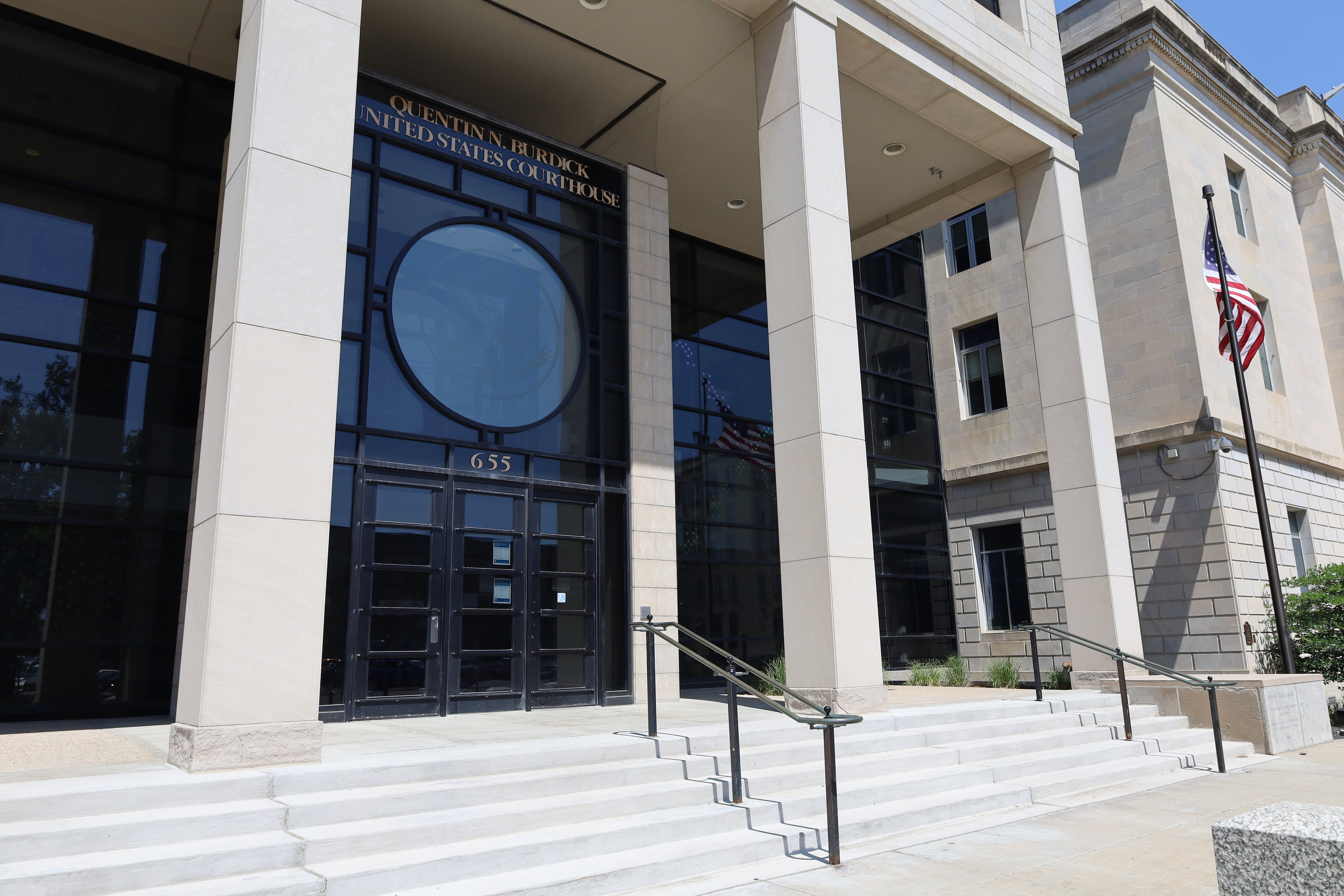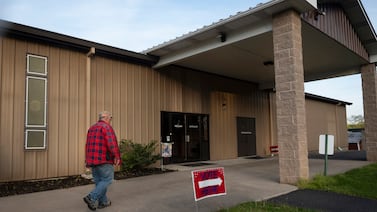Votebeat is a nonprofit news organization reporting on voting access and election administration across the U.S.
A version of this post was originally distributed in Votebeat’s free weekly newsletter. Sign up to get it delivered to your inbox every Saturday.
The Campaign Legal Center’s Mark Gaber had just wrapped up a trial over redistricting in Washington state, representing plaintiffs who argued that newly redrawn political maps diluted the strength of Hispanic voters, on June 7. There was not much time for catching his breath before he had to help argue a similar redistricting case the following week, in North Dakota.
Gaber woke up the next morning to a phone exploding with text messages. The Supreme Court had released an eagerly awaited decision, in Allen v. Milligan. The case had the potential to radically change the legal standards used in redistricting cases like the one he’d just argued.
The upshot: A majority of justices had essentially defied the expectations of pundits and upheld the status quo, preserving the Voting Rights Act and leaving decades-old standards for establishing racially discriminatory effects in place.
“Am I actually awake?” Gaber recalls asking himself. The decision couldn’t have been more important to his work. As it turns out, Gaber would help argue both the last redistricting case before Milligan and the first one after it. He was also part of a team of lawyers representing Native American plaintiffs challenging legislative boundaries in North Dakota. If the Supreme Court had decided Milligan differently, it could have upended both cases.
As it was, the pending opinion had cast a long shadow — the latest court case that had the potential to radically reshape the reach of the Voting Rights Act. He and his colleagues had crafted trial strategies based on the existing standards, wondering all along whether the Supreme Court was about to radically change them.
“No one really knew what the court was going to do, so we obviously weren’t going to take any super affirmative steps toward a guess,” said Michael Carter, an attorney with the Native American Rights Fund. Carter, along with Gaber, is part of the team representing the Spirit Lake Tribe and the Turtle Mountain Band of Chippewa, tribes suing over the North Dakota maps.
Gaber said he and his fellow lawyers had thought about whether they should wait for the Supreme Court’s opinion before proceeding. No one knew exactly when the Supreme Court would release its opinion.
In Washington state, Gaber was part of a team of lawyers arguing the state’s redistricting commission spread Latino voters across multiple legislative districts in the Yakima Valley, preventing them from being able to elect candidates of their choice. In North Dakota, the tribes also alleged that state legislative districts were drawn in a way that reduced their ability to elect candidates of their choice, pointing to the fact that in the wake of elections held under the new maps, the state Senate for the first time since 1991 had no member who was also an enrolled member of a tribe located within the boundaries of the state.
But a decade after the Supreme Court struck down a key part of the landmark Voting Rights Act in its Shelby County v. Holder decision, Milligan had the potential to limit the law even further. A majority of justices could have, for example, laid out a new test to determine whether maps had racially discriminatory effects, or, perhaps, required proof that those drawing the maps did so with a racially discriminatory intent. Instead, the opinion, by Chief Justice John Roberts, upheld the so-called Gingles test, which has been in use for decades.
Some federal judges put redistricting cases on hold until the Supreme Court released its decision. In fact, lawyers representing parties in the Washington state case had asked the judge there to delay the trial until after the Supreme Court released Milligan, writing it “will inevitably impact this proceeding and will likely be determinative.”
But that trial went ahead, legal uncertainty notwithstanding, and so did preparations for the North Dakota trial.
“We sort of proceeded optimistically as if the Supreme Court was going to follow decades of precedent,” Gaber said. “And that’s the way we had to proceed. Otherwise, you’d be forgoing the chance of relief for these very meritorious claims for an additional election cycle,” because delaying the trials for the Milligan decision would likely mean there wouldn’t be enough time to put new maps in place in Washington and North Dakota before the 2024 election.
When the decision landed, Carter said it was “a relief.”
It “sent a really clear message that Section 2 of the Voting Rights Act is intact and [lawmakers] have to ensure that their maps don’t have the effect of discriminating against racial minorities,” said Molly Danahy, a lawyer with the Campaign Legal Center who is also part of the legal team representing the tribes challenging the North Dakota maps.
Gaber, Danahy, and Carter said they feel they have a strong case in North Dakota; the federal judge hearing the case said he hopes to rule as soon as possible. The North Dakota secretary of state’s office did not respond to a request for an interview about how Milligan affected the case.
Of course, the uncertainty isn’t over. Anyone who works on voting issues knows there’s always another case. Carter and others point to one out of Arkansas pending in the 8th U.S. Circuit Court of Appeals over whether private individuals have the right to sue under the Voting Rights Act, even though they’ve been doing so for decades.
“There’s always a possibility of something new happening that changes the legal landscape,” Carter said, adding, “and then we have to adjust and figure out what we’re going to do next.”
Back Then
One occasion on which the Supreme Court really threw voting cases off balance was, of course, the Shelby County decision in 2013. A quick tale of a lawyer who had to react much differently than Gaber:
Minutes after the Supreme Court announced that a preclearance requirement for new voting laws was, for at least the time being, no longer a thing, then-Attorney General Greg Abbott tweeted voter ID into law. Really. And the very next day, attorney Chad Dunn filed a lawsuit against the state on behalf of Rep. Marc Veasey and three voters. Dunn had been present at the Supreme Court when the decision was read — having previously successfully argued the federal government should block the law in preclearance — and saw Abbott’s tweet while standing on the steps of the courthouse. “I put my phone back in my pocket, and went straight to my hotel room and worked all night on a lawsuit,” he said.
New From Votebeat
From Votebeat Texas: Gov. Abbott vetoes bill offering new mail voting option to people with disabilities
In Other Voting News
- Republicans and activists are targeting disinformation researchers with subpoenas and litigation alleging an organized campaign to collude with government officials, with the intent of suppressing speech, the New York Times reported. Researchers say the effort is impeding their effort to conduct research and target disinformation as the 2024 election nears.
- Maricopa County Recorder Stephen Richer has sued failed GOP candidate Kari Lake for defamation, alleging that she and her allies have falsely claimed without evidence that Richer, also a Republican, sabotaged her gubernatorial bid, the Washington Post reported. The lawsuit is an unusual effort to hold a candidate responsible for false claims that undermine trust in elections.
- Ohio election officials around the state, already under pressure preparing for an unusual Aug. 8 election, must in many cases reprint ballots or reprogram machines after state officials sent them incorrect language for a ballot initiative, cleveland.com reported.
- After years of bashing it, leading Republicans are now launching efforts to convince GOP voters to use mail voting, a popular method of casting ballots that former President Donald Trump and others had previously claimed compromised the integrity of elections, the New York Times reported.
- Previously unreported emails and communications reveal new details about former President Donald Trump and his allies’ attempts to pressure Pennsylvania lawmakers into rejecting the results of the 2020 presidential election, showing how conspiracy theories circulated and revealing previously unreported doubts about the effort, the Philadelphia Inquirer reported.
Carrie Levine is Votebeat’s story editor and is based in Washington, D.C. She edits and frequently writes Votebeat’s national newsletter. Contact Carrie at clevine@votebeat.org.





